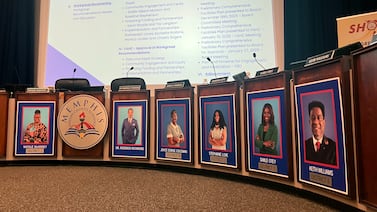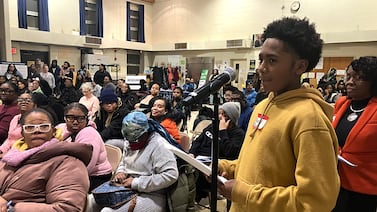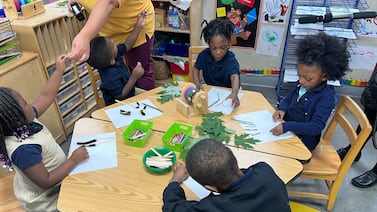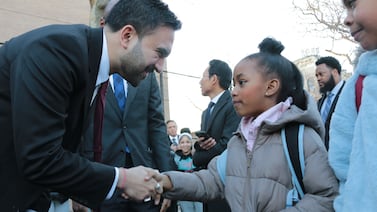Following my first year as a teacher, I thought teaching wasn’t for me, and I quit. I left the profession for something completely different, but I didn’t feel fulfilled.
I came back and found a new school where I’ve taught for five years. I feel supported by the community, the district, the parents, the team, and my administration. I even hope to stay long enough to retire here.
Most teachers go into this profession with heart and love to build better communities and to give kids the strategies and tools to handle what will come their way, but as someone who left the profession for a time, I know we have a teacher shortage for a reason.
How can I support other teachers who are struggling right now? What are things I can do, as a teacher, to help with the teacher shortage? — Hungry to Help
[Are you a teacher? Submit your question for our advice column here.]
Hungry to Help,
Robert John Meehan said, “The most valuable resource that all teachers have is each other.” Teachers are built differently.
Like you, I also left the profession and came back after feeling unfulfilled. I’m glad we both returned to education.
You’re also right in your assessment that most teachers don’t feel as supported as you do now and many are leaving the profession. As teachers, we are handling America’s education challenges by implementing every management strategy we can employ.
Every day, I see teachers miraculously save each other, and many of us recognize the need to hold one another up.
The needs of teachers can vary from building to building, city to city, and state to state. The first step in helping teachers in your community who are on the verge of quitting sounds simple but isn’t done enough: Ask them what they need and listen to their answers.
Here is how my peers and I support each other
We are each other’s safe spaces. We vent without fear of retribution. One of us is always the voice of reason. When we go too far or start taking the job personally, we reel each other back in. The best part about our time together is everyone is welcome: new teachers and veteran teachers. We are race- and gender-inclusive.
We get to know each other as people outside of our profession. We talk about our kids and spouses. We discuss projects we have going outside of work. We also vary our meeting locations to support local restaurants and find respite from the school buildings where we work.
You can build this in your community or school by starting a social committee. Even if it’s a small group, plan one activity per term and invite teachers and staff — offer people a small prize or token of appreciation for attending (as with our students, candy or snacks can be a big motivator). Build momentum by surveying attendees about their interests. Extend a special greeting to new teachers and ensure they receive a more personal invitation.
We collaborate. All over America, school districts have closely monitored, time-bound mandates. In our building, we work together to meet our deadlines.
I began collaborating with colleagues when our department chairs conceived an intervention plan to allow teachers to push into each other’s classes. We found that having an extra certified adult in the room increased time on task and student engagement.
Our professional development plans, units of instruction, and responses to intervention are completed together in small groups. We read aloud and edit finished copies before sending them to principals.
I published my first fiction book because two amazing English teachers met me for dinner and volunteered to read every page. I would not have accomplished my dream of becoming an author without their support.
Hungry for Help, ask your colleagues what they need help with.
We lose sleep over problems in our classrooms and buildings. There are times when we must have gripe sessions. I have found, however, that our conversations are laced with solutions.
We talk to union representatives. When we recognize problems and brainstorm solutions, our elected union representatives are available to present our concerns to the board of education.
Last week, we were required without proper notification to complete and submit district-required paperwork. Our union representatives sprung into action, and we were granted a 30-day extension.
Review your policy handbook to know when to raise an issue with the union representative.
Hungry to Help, if you want to support your fellow teachers, consider becoming a building or district union representative. You could even work on the national level. Someone has to represent our voices.
We guest teach each other’s classes. The teacher shortage is a heavy burden. Not being able to go to doctor’s appointments or take off when you feel ill creates poor working conditions. When we need emergency assistance, we help each other as much as possible.
Last month, I covered another teacher’s class, and she bought me a bag of candy corn. I was so excited. I smile every time I think about her kindness.
Offer to guest teach or step into a peer’s classroom if you see your friend needs a break.
Teachers are human. We need kindness. We need each other. When you see a teacher struggling, ask them what they need, and try to help them work through their problem. Bring in others you trust as needed.
If we can commit to supporting each other, and finding solutions, it will create better relationships and better working conditions for us all.
Dr. Kem Smith is Chalkbeat’s first advice columnist. She is a full-time 12th-grade English teacher in St. Louis, Missouri. Submit your question to Dr. Kem via this submission form, and subscribe to How I Teach to receive her column in your inbox.
If you have a rebuttal or additional advice you’d like to share with Hungry to Help, please email afterthebell@chalkbeat.org.







